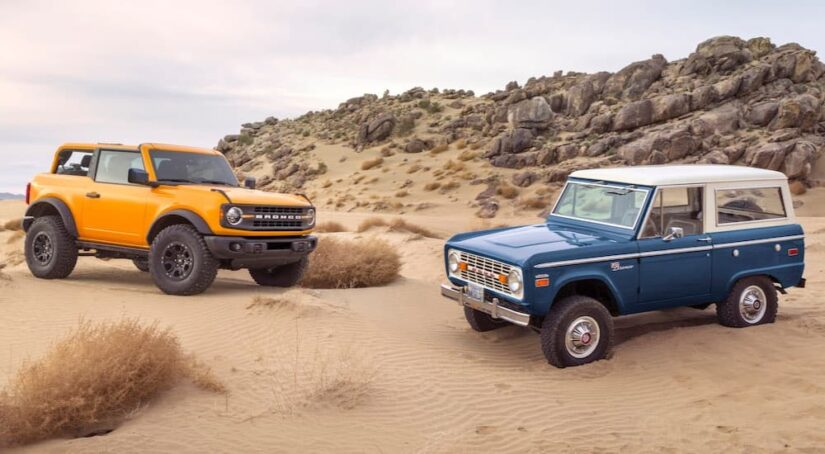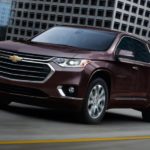What do Toyota, Subaru, and Honda have in common? These are three of the most highly valued automotive brands on any used lot, with models like the Tacoma, 4Runner, Tundra, Outback, Forrester, Civic, and Accord praised for their high resale values. These models are renowned for their versatility, reliability, and longevity, heightening their appeal to drivers enticed by the new car smell and those looking to stretch their hard-earned dollars with a pre-owned model.
These vehicles also answer a popular question in the industry, “Do discontinued cars lose their value quickly?” How so? Models like the Tacoma, 4Runner, Outback, Civic, and Accord are in high demand and currently in production. They’ve spent decades establishing their reputations, earning their acclaim, and proving their value mile after mile. So, where does this leave discontinued models?
Are discontinued cars entirely obsolete? Should they be avoided like the plague? Or are there any advantages to shopping for a car that an automaker has officially bid farewell to? As a kid who grew up playing “Slug Bug” anytime a Volkswagen Beetle passed, the answer seems obvious. But is it?
Out With the Old: What It Means to Discontinue a Model
It’s easy to critique something when you’re standing on the outside. For example, the idea of discontinuing models like the Ford Bronco and Volkswagen Beetle seems preposterous today, especially with Ford reintroducing the Bronco to widespread acclaim over the last few years. As someone who dreams of owning a Bronco, it’s hard for me to imagine the SUV couldn’t pull its weight and was discontinued decades ago. However, I’m on the outside looking in.
Automakers discontinue models for several reasons, often because of declining sales. In other instances, cars are discontinued because automakers have big plans for the future, like introducing a more capable and tech-savvy successor to fill the vacancy. This cycle of “out with the old and in with the new” maintains our interest and keeps the industry exciting, but it’s also the foundation of its evolution as the world’s leading automakers introduce new features, more potent powertrains, and next-level luxuries that exceed our expectations.
Depreciation: Understanding Value on the Car Lot
Every vehicle depreciates, some faster than others. New cars lose as much as 11% in value as soon as they leave the lot, which is part of the appeal of buying a used model. Buyers know they’re paying closer to the actual vehicle of a vehicle and getting more for their money. For example, your $30,000 budget may only get you into a new base model, but can easily stretch to a higher-tier trim when shopping used.
But where do discontinued models fit into the picture? The word “discontinued” paints the picture of a castaway or a model that wasn’t appealing or profitable enough for the automaker to keep around. While that certainly can be true, there’s another side to consider. Some discontinued models have loyal followings, fetching high prices from car collectors willing to pay a premium. Think about the Volkswagen Beetle. Collectors were quick to snag a Beetle long before Volkswagen discontinued the model in 2019. Even my dad fondly remembers his first car, a yellow Bug that he regrets selling on a whim.
It’s easy to see that a model like the Beetle usually defies convention and holds its value as a discontinued model. The same is valid for limited-production runs like the Dodge Durango SRT Hellcat. Both are icons, offering the appeal of owning something rare, exclusive, or sometimes both. These discontinued models provide an edge that guarantees that you stand out in the crowd, holding a piece of history or a badge of honor that so many others covet. In this sense, discontinued models gain the advantage and become more valuable after their final curtain call.
Why Consider a Discontinued Car?
A discontinued car can be an excellent option for many drivers, even if you don’t invest in an icon like the Volkswagen Beetle, or a revered adventurer like the Ford Bronco of decades past. So, why consider a regular, run-of-the-mill discontinued car, truck, or SUV? What advantages do these models offer that many people overlook? What else should you consider?
More Room for Negotiation
Discontinued cars can fall on both ends of the price spectrum, depending on the model and demand. Higher demand yields higher pricing because dealerships know customers will pay a premium. Alternatively, many discontinued cars, trucks, and SUVs are budget-friendly because dealerships hope to move inventory to make room for newer models. Either way, there’s always room for negotiation, with dealerships often offering promotions and discounts that add to your savings.
Gambling on Value
It’s nearly impossible to predict a vehicle’s depreciation because you can’t foresee the future. While we know that models from Toyota, Honda, and Subaru tend to hold their values incredibly well, no hard and fast rule guarantees as much. You’re still gambling that this will hold true years down the road when you’re ready to sell or trade.
With a discontinued model, it’s impossible to know if your investment will potentially earn you money. Consider everyone who owned a Pontiac Aztek in the new millennium. At the time, the Aztek was considered one of the ugliest models in the industry, explaining its short tenure in the General Motors lineup from 2001 to 2005. Believe it or not, Aztek owners got the last laugh when the hit series Breaking Bad debuted in 2008 with an Aztek on the screen. The ugly SUV’s popularity skyrocketed, sending its value right along with it.
After Purchase Support
One of the biggest factors in purchasing a discontinued car is evaluating the available post-purchase support. Think about what happens when the model needs a complex repair or a specific component. Who can provide this support? Are parts readily available?
Decades ago, General Motors bid a fond farewell to its Saturn lineup, but there are still Saturn cars and SUVs on the road today. While these drivers don’t necessarily have a Saturn dealership they can rely on, there are obviously still parts available through General Motors and third-party manufacturers. You’ll often find this level of support with most modern discontinued vehicles, with Ford, Lincoln, Toyota, Honda, Chevrolet, Buick, and the other major automotive brands offering parts and support for their vehicles, whether or not they’re still in production.
There is a caveat to this, however. Think about models like the Pontiac Aztek and its short production run from 2001 to 2005. Four years isn’t a long time to build a vast catalog of aftermarket support or a loyal community of Aztek owners. In this case, parts might be available, but the catalog may not be as expansive, limiting your modifications or ability to upgrade the vehicle the longer you own it. As always, doing adequate research is critical before finalizing your purchase to ensure you know how accessible parts are and where to find them.
Final Thoughts and Considerations
Buying a discontinued car isn’t for everyone, and that’s perfectly alright. Many drivers want the latest and greatest models, and a discontinued car is often the opposite because the automaker has said as much. It’s the embodiment of “out with the old and in with the new.”
However, discontinued models can be excellent investments for certain drivers. If you’re looking for a budget-friendly car that offers more room for negotiation and plenty of after-purchase support, a newly discontinued model is ideal. Alternatively, it may be time to bring your automotive dreams to life and get behind the wheel of a rare speed demon like the Durango SRT Hellcat or an icon like the Beetle. As collectors’ cars, you know ahead of time that you’re willing to pay a higher price to bring your vision to fruition.
So, where do you fall? As you shop for a discontinued model, whether a newer model or a collector, dig in and do your homework just as you would a new car, truck, or SUV. Look into why it was discontinued, from its safety ratings to its reviews. With this information and a few test drives, you can make an informed decision and have confidence in your next purchase.



